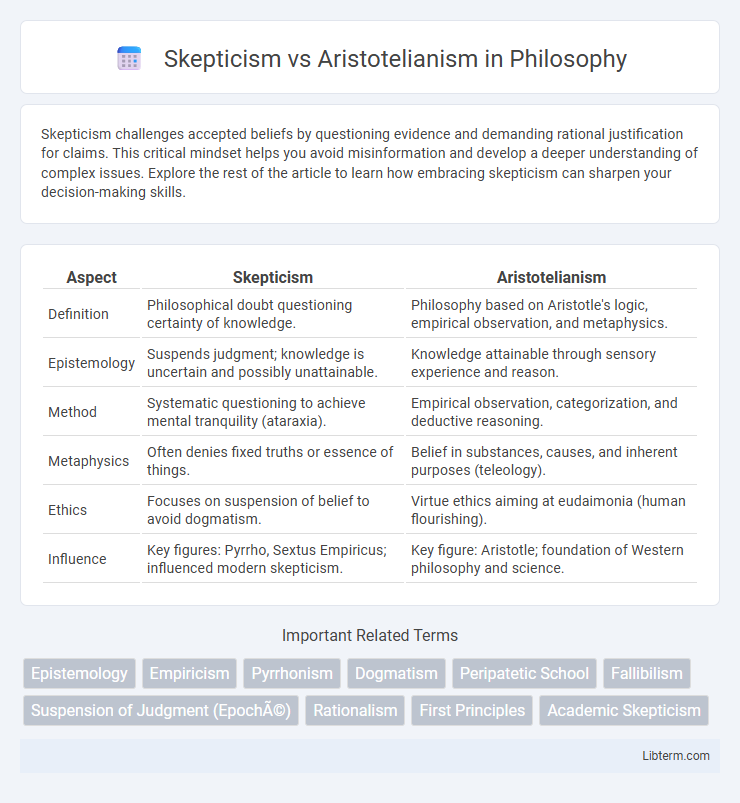Skepticism challenges accepted beliefs by questioning evidence and demanding rational justification for claims. This critical mindset helps you avoid misinformation and develop a deeper understanding of complex issues. Explore the rest of the article to learn how embracing skepticism can sharpen your decision-making skills.
Table of Comparison
| Aspect | Skepticism | Aristotelianism |
|---|---|---|
| Definition | Philosophical doubt questioning certainty of knowledge. | Philosophy based on Aristotle's logic, empirical observation, and metaphysics. |
| Epistemology | Suspends judgment; knowledge is uncertain and possibly unattainable. | Knowledge attainable through sensory experience and reason. |
| Method | Systematic questioning to achieve mental tranquility (ataraxia). | Empirical observation, categorization, and deductive reasoning. |
| Metaphysics | Often denies fixed truths or essence of things. | Belief in substances, causes, and inherent purposes (teleology). |
| Ethics | Focuses on suspension of belief to avoid dogmatism. | Virtue ethics aiming at eudaimonia (human flourishing). |
| Influence | Key figures: Pyrrho, Sextus Empiricus; influenced modern skepticism. | Key figure: Aristotle; foundation of Western philosophy and science. |
Introduction to Skepticism and Aristotelianism
Skepticism questions the possibility of certain knowledge by emphasizing doubt and critical examination of beliefs, often challenging the reliability of sensory perception and reason. Aristotelianism, founded on Aristotle's philosophy, asserts that knowledge arises from empirical observation and logical analysis, promoting a systematic approach to understanding reality through causes and categories. Both frameworks influence epistemology, with Skepticism fostering critical inquiry and Aristotelianism emphasizing structured knowledge acquisition.
Historical Origins and Development
Skepticism originated in ancient Greece with Pyrrho of Elis around the 4th century BCE, advocating suspension of judgment to attain mental tranquility, contrasting with Aristotelianism, founded by Aristotle in the 4th century BCE, which emphasized empirical observation and logical analysis as paths to knowledge. Aristotelianism developed through systematic categorization of knowledge and principles of causality, influencing medieval scholasticism and Renaissance science, while Skepticism evolved through the Academic Skeptics and later influenced Enlightenment thinkers questioning certainty. Both schools significantly shaped Western philosophical traditions by challenging and refining concepts of knowledge, truth, and belief.
Core Principles of Skepticism
Skepticism emphasizes doubting and suspending judgment on knowledge claims, asserting that certainty is often unattainable. It challenges the Aristotelian principle of absolute truths and fixed categories, advocating for continuous questioning and empirical evidence evaluation. Core principles of Skepticism include epoche (suspension of judgment), inquiry, and the avoidance of dogmatism to achieve mental tranquility.
Fundamental Tenets of Aristotelianism
Aristotelianism centers on the belief in objective reality and empirical observation as the foundation of knowledge, emphasizing causality, substance, and the four causes (material, formal, efficient, and final). It asserts that reality can be understood through systematic classification and logical analysis, promoting the potential for certain knowledge about the natural world. This contrasts with Skepticism, which questions the possibility of absolute knowledge and relies on continuous questioning rather than definitive conclusions.
Approaches to Knowledge and Truth
Skepticism challenges the certainty of knowledge by emphasizing doubt and continuous questioning of beliefs, asserting that true knowledge is often unattainable. Aristotelianism promotes empirical observation and logical reasoning as pathways to acquiring knowledge, advocating for objective truths grounded in the natural world. This contrast highlights skepticism's focus on epistemic humility and Aristotelianism's pursuit of definitive understanding through systematic inquiry.
Methods of Inquiry and Reasoning
Skepticism emphasizes systematic doubt and continuous questioning as core methods of inquiry, challenging the certainty of knowledge claims through rigorous critical examination. Aristotelianism relies on empirical observation and deductive reasoning, using structured syllogisms and logical categorization to derive conclusions from established premises. While Skepticism promotes suspension of judgment to avoid error, Aristotelianism seeks definitive knowledge by combining sensory experience with rational analysis.
Contrasts in Ethical Perspectives
Skepticism challenges the certainty of ethical knowledge, promoting suspension of judgment on moral truths due to their subjective and variable nature. Aristotelianism asserts objective ethical standards grounded in human nature and the pursuit of eudaimonia, or flourishing, through virtuous living. This contrast highlights Skepticism's emphasis on epistemic humility versus Aristotelian confidence in stable moral virtues as a path to the good life.
Influence on Western Philosophy
Skepticism challenged the certainty of knowledge, profoundly influencing Western philosophy by encouraging critical inquiry and the questioning of dogmatic beliefs. Aristotelianism, grounded in empirical observation and logic, established foundational principles for metaphysics, ethics, and natural sciences, shaping medieval scholasticism and modern scientific methods. Both schools laid the groundwork for intellectual development by contrasting doubt with systematic knowledge, driving philosophical discourse from antiquity to the Enlightenment.
Contemporary Relevance and Applications
Skepticism challenges established knowledge by continuously questioning beliefs, fostering critical thinking essential for scientific inquiry and ethical decision-making in contemporary society. Aristotelianism provides a structured framework based on empirical observation and logical reasoning, influencing modern philosophy, ethics, and natural sciences through concepts like causality and virtue ethics. Together, these philosophies inform debates in epistemology, artificial intelligence, and cognitive sciences, shaping approaches to knowledge validation and moral frameworks today.
Conclusion: Bridging Skepticism and Aristotelian Thought
Bridging Skepticism and Aristotelianism involves recognizing the value of empirical observation and logical reasoning while maintaining a critical stance towards absolute certainty. Aristotle's emphasis on systematic inquiry complements the skeptic's demand for ongoing questioning and evidence evaluation. This synthesis promotes a balanced philosophical approach that encourages knowledge acquisition through reasoned skepticism and empirical validation.
Skepticism Infographic

 libterm.com
libterm.com